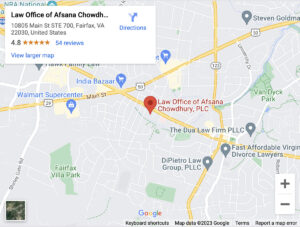
A Last Will and Testament (“will”) is a crucial element of an estate plan. Regardless of your financial, marital, or parental status, everyone needs a will. Without a will, your wishes are not considered after your death, and your family may incur more time and expense in probating your estate.
Our Fairfax estate planning lawyers at Chowdhury Divorce Law Group, have over a decade of combined legal experience. We help clients with all aspects of estate planning, including preparing and executing wills. We help you draft a will that meets your needs and fulfill your wishes after death.
Contact Chowdhury Divorce Law Group, or call today at (703) 271-6519 to schedule a confidential consultation with an experienced Fairfax wills lawyer.
How Our Fairfax Estate Planning Lawyers Help You Develop an Effective Estate Plan and Will

Many people hesitate to contact a Fairfax wills lawyer to discuss estate planning. Discussing issues related to dying may be uncomfortable, or they might believe they do not need a will.
However, your will benefits your family members and heirs more than you. Virginia estate laws are complicated. A will can simplify the probate process and make it less stressful for your family. Without a will, the probate process can be much more difficult than it needs to be for your family.
When you hire our estate planning lawyers in Fairfax, we will help you by:
- Taking the time to listen to your goals and wishes for estate planning
- Assist you in prioritizing issues to accomplish your desires
- Explain how Virginia law impacts wills and estates
- Discuss various estate planning tools to execute with your will, such as trusts, powers of attorney, and advance medical directives
- Work to minimize gift and estate taxes
- Prepare your will and other estate planning documents to ensure they are legally enforceable
- Discuss the importance of reviewing your will and estate plan periodically and after specific life events
While there are templates for wills online, we strongly advise against using a template. These templates may not cover all matters or qualify as a valid will in Virginia.
Our Fairfax wills lawyer customizes your will to meet your specific needs. We do not use one-size-fits-all wills because they are not an effective solution. Instead, we take the time to develop a comprehensive estate plan that takes into account your unique circumstances and wishes.
Call Chowdhury Divorce Law Group, to schedule an initial consultation with an experienced wills lawyer in Fairfax, VA.
What Are the Requirements for a Will in Virginia?
According to Section 64.2-403 of the Code of Virginia, a will is valid under these circumstances:
- The will is in writing and signed by the testator (i.e., the person making the will) or by someone in the testator’s presence who is directed to sign the will by the testator in the presence of two independent witnesses.
- A will is entirely in the testator’s handwriting, signed by the testator, and proved by at least two disinterested witnesses. This type of will is called a holographic will.
- A will not wholly in the testator’s handwriting must be signed by the testator or acknowledged by the testator in the presence of two witnesses.
A testator must be over the age of 18 years old and be of sound mind to execute a will. Witnesses cannot be named in the will and must be over 18 years old.
A will does not require a self-proving affidavit, but it is strongly recommended. A self-proving affidavit affirms the will was executed correctly. The testator, the witnesses, and a notary public must sign the affidavit. Without a self-proving affidavit, one of the witnesses must be located to confirm the validity of the will and possibly appear in court to swear under oath the testator executed the will.
What Are the Benefits of Having a Will as Part of an Estate Plan in Fairfax, VA?
Executing a will has many benefits. Some reasons to consider if you are unsure about making a will include:
Ensures Your Property Is Distributed According to Your Wishes
Your will dictates how your property is to be divided upon your death. Without a will, Virginia intestate laws determine how your property is distributed.
Intestate laws do not allow your estate to be distributed to charities or friends. Your spouse receives one-third of your estate, and your children divide the remaining two-thirds. The estate passes to the next closest relative if you do not have a surviving spouse or children.
Choose Someone to Administer Your Estate
Your will names a personal representative to administer your estate. The personal representative manages the distribution of your estate and ensures your wishes are carried out.
Express Funeral and Burial Arrangements
Your will can include your wishes for your funeral and burial. However, these terms are non-binding, so it is best to discuss these arrangements with your loved ones after you execute your will to avoid confusion about what you want.
Choose a Guardian for Minor Children
Parents appoint a guardian to care for their children if they die while their children are minors. Generally, a child’s other parent automatically receives custody when a parent dies. A will states that if your child’s other parent predeceases you or you die simultaneously, you wish for this person to serve as guardian.
Parents Can Include a Testamentary Trust in a Will
A parent can include a simple trust in their will that states a child’s inheritance is to be held in trust until they reach a specific age. The will names a person to serve as the trustee. Without a testamentary trust or other trust agreement, your child receives their entire inheritance upon their 18th birthday.
Charitable Donations
You can leave a legacy by naming a charity as an heir in your will. Your will specifies the amount of money or assets the charity receives from your estate.
Reduce Family Disputes
Without a will, your family may disagree about how you want to distribute your estate. A will does not prevent all disputes, but it can reduce disputes because your wishes are clearly outlined in writing for the entire family to read.
How Do I Modify My Will After I Sign It If Something Changes?
You can revoke your will in one of several ways. A testator revokes a will when they use any physical act to destroy the original will, such as:
- Burning
- Cutting
- Shredding
- Tearing
You can revoke a will by executing a codicil or subsequent will. A codicil is an amendment to the will that changes or revokes a portion of the will. You can execute a new will that states all wills executed prior to the current will are revoked and invalid.
Reviewing your will periodically to ensure it meets your current needs and wishes is crucial. Life events can require a modification of your will. You may need to revoke or modify your will if you experience life-changing events such as:
- The death of an heir, beneficiary, trustee, or personal representative
- Marriage or divorce
- Moving to a new state
- Selling or transferring property specifically named in the will
- Retirement
- The birth or adoption of a child
- A child reaching the age of majority
- A change in finances, property, or debts
If it has been a while since you signed your will, contact our Fairfax wills lawyer to schedule a time to review your will. We can help you make necessary changes to ensure your will represents your current needs.
Other Estate Planning Documents to Consider With Your Will
A will is a type of estate planning document. When executing your will, your attorney discusses other documents that protect you and your family. Estate planning documents you may need in addition to a will include, but are not limited to:
- A Durable General Power of Attorney to appoint an agent to handle financial matters if you become incapacitated. A power of attorney can avoid the need for a court-appointed conservator.
- Beneficiary designations name individuals who receive assets that pass outside of your probate estate. These assets include life insurance policies, retirement accounts, and other financial accounts.
- Trust agreements create legal entities to hold property. Trusts accomplish many goals, including providing for a family member with special needs, establishing charitable giving, reducing the value of your taxable estate, and protecting assets.
- Advance medical directives allow you to name someone to make medical decisions for you and direct end-of-life care if you develop a terminal illness.
Each estate is unique. You could need additional estate planning documents to accomplish your goals and protect your property and family. We will help you navigate the estate planning process, beginning with a validly executed will.
Schedule a Free Consultation With Our Fairfax Wills Lawyer
If you have questions about wills and estate plans, contact Chowdhury Divorce Law Group, to schedule a consultation with our Fairfax wills lawyer. We can help with wills, estate planning, and other probate matters.


